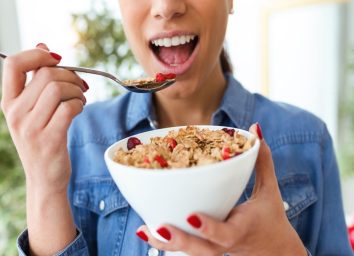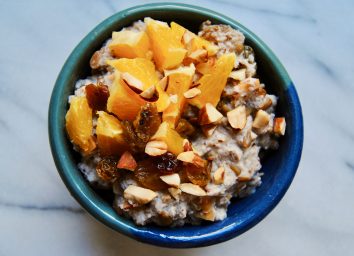9 Best Drinks To Reduce Inflammation, Says Science

Like high blood pressure, chronic low-grade inflammation is a silent problem with few easy-to-recognize symptoms, like weight gain, fatigue, joint pain, skin problems, and digestive issues, among others. While any number of problems can cause these symptoms, one of them might be chronic low-grade inflammation—that is, when your body’s immune system pumps out inflammatory substances as a way of dealing with injury and disease. It’s essentially the bad side effect of a good thing.
Although a short-term inflammatory immune response helps us fend off an attack, it’s not good when the inflammation lasts for an extended period. Often triggered by poor lifestyle choices, chronic inflammation harms our cells over time. Since chronic, low-grade inflammation is so closely tied to the stuff we bring into our bodies—like tobacco smoke, chemicals, red meat, alcohol, sugary, and highly-processed foods—changing lifestyle habits is an effective way to cool our inflammation. One of the easiest ways to go about this is to start by choosing the best drinks for inflammation, particularly those that can act as anti-inflammatories.
To learn about the best drinks for inflammation, we spoke with expert dietitians to find out more about the connection between food, drinks, and inflammatory responses. If chronic, low-grade inflammation is among your health concerns, read on to learn which drinks can effectively help reduce it—and for more healthy eating tips that can help mitigate symptoms and side effects associated with inflammation, don’t miss 6 Foods That Reduce Inflammation and Slow Aging.
Lemon water
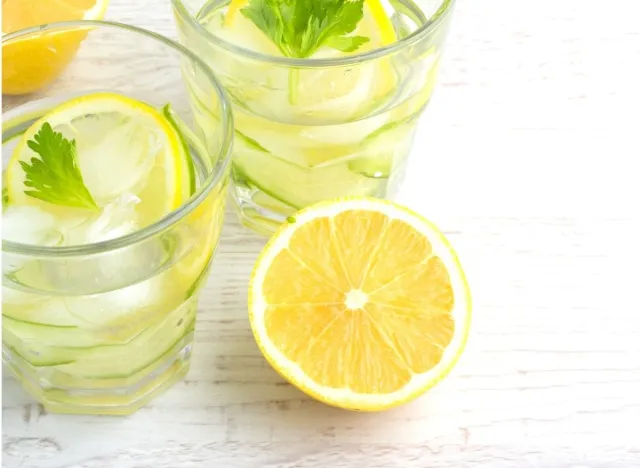
If you’re looking for a refreshing beverage that’s more flavorful than water and can help with inflammation, you may want to think about incorporating a simple glass of lemon water on a regular basis.
“The high vitamin C content of lemons make lemon water a powerful antioxidant and anti-inflammatory beverage,” says Trista Best, MPH, RD, LD, at Balance One Supplements. “These antioxidants reduce oxidative stress, a primary contributor to inflammation.” According to a study published in Drug Design, Development and Therapy, vitamin C was able to reduce inflammation in obese participants with hypertension or diabetes, by way of lowering fasting blood glucose, as well as inflammatory markers such as C-reactive proteins and interleukin.
Celery juice
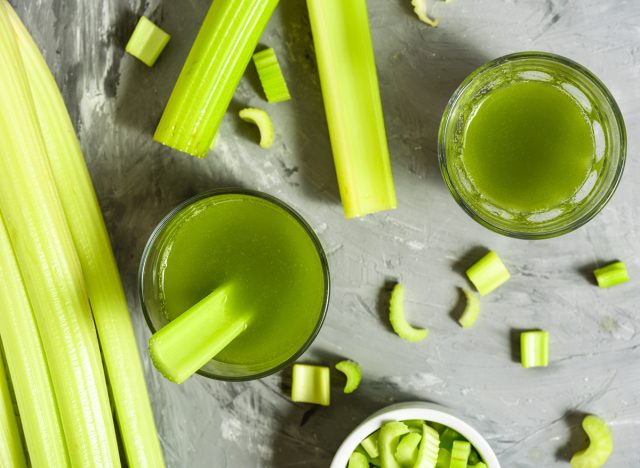
Some people may underestimate the power of celery juice and write it off as a mere wellness fad. However, celery juice may be one of the best drinks to have for inflammation.
“Celery juice has fiber, which can help to improve digestion and reduce the risk of constipation,” says Best. “Some studies have suggested that celery juice may have anti-inflammatory properties, which could help to reduce the risk of chronic diseases such as heart disease and diabetes.”
This green juice can also improve your hydration as well, something that research shows may be connected to inflammation. “Celery is made up of mostly water, and juicing it can help to increase your fluid intake and promote hydration,” says Best. According to a report published in the American Society for Clinical Investigation, your hydration levels are associated with inflammation markers and chronic age-related disease prevention.
Coffee
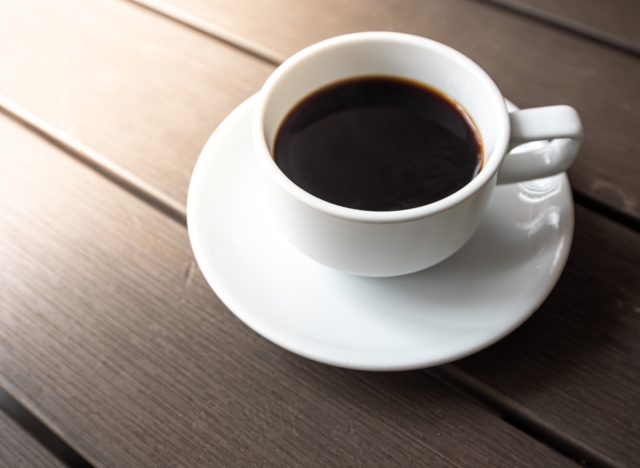
There is good news for those who love waking up with a cup (or two) of Joe every morning: coffee has been found to have anti-inflammatory properties and therefore can be a great beverage to choose for inflammation. According to a review published in the BMJ, coffee contains compounds like kahweol, cafestol, and (best of all) caffeine, which give it certain anti-cancer, antioxidant, antifibrotic, and anti-inflammatory qualities.
Drinking your coffee black is going to be your best bet when it comes to fully enjoying its anti-inflammatory properties, as research has shown that diets higher in sugar can contribute to inflammation. If you’re not a fan of black coffee, just try limiting your intake of added sugar and super sugary coffee creamers.
Pineapple juice

One of the most researched and most powerful anti-inflammatories is bromelain, an enzyme found in abundance in pineapple. A review of studies on bromelain in the journal Foods in 2021 explored its many possible therapeutic effects for the treatment of cancer, burns, and cardiovascular disease due to its anti-coagulant properties, allergies, sinusitis, and arthritis. One reason bromelain is so effective is that it has a high bioavailability, meaning it is absorbed quickly by the body and remains potent for a significant amount of time.
Studies have shown that bromelain produces both analgesic and anti-inflammatory effects in patients with rheumatoid arthritis and reduces knee pain and inflammation in patients with osteoarthritis. Pineapple juice taken after exercise may even relieve post-exercise inflammation by helping to repair and ease muscle soreness because it is also rich in potassium.
While all parts of the pineapple contain bromelain, most of this magical compound is found in the stem. Because the stem is a little on the tough side, you can blend or juice the core with the sweeter flesh to make a delicious anti-inflammatory elixir.
Warm turmeric milk
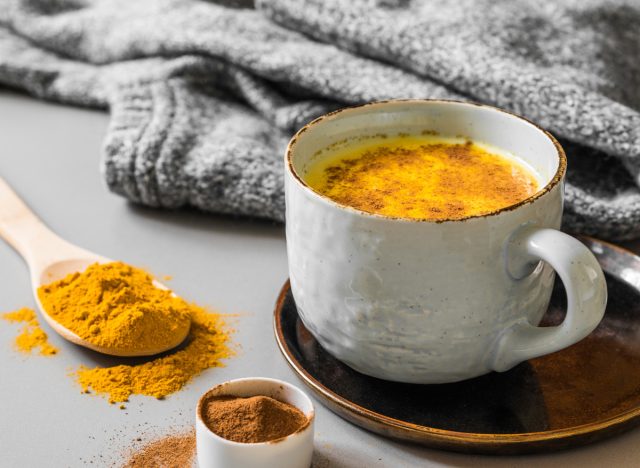
Turmeric is a yellowish-orange spice containing a powerful anti-inflammatory compound called curcumin, which has been shown to help reduce the risk of many chronic diseases as well as relieve inflammatory pain from osteoarthritis. In one 2019 study of turmeric’s effectiveness, 139 patients with knee osteoarthritis were split into two groups. One group took a turmeric capsule three times a day, while the other group took a 50-milligram tablet of the non-steroidal anti-inflammatory drug diclofenac twice a day. After 14 and 28 days, all the patients were scored for pain severity. The researchers found that the natural spice was just as effective as the popular NSAID at reducing knee pain and inflammation and resulted in fewer adverse side effects.
Turmeric powder is easy to mix into smoothies and it also makes a pleasing tea. But since curcumin is absorbed better by the body when taken with some fat, adding milk or avocado to your turmeric smoothie is a smart option. Or, try warm turmeric milk made with almond milk and coconut oil (for the fat). Whisk the following ingredients into a saucepan, bring to a boil, then turn down the heat and simmer for 10 minutes: 2 cups unsweetened almond milk, 1 tablespoon of honey (optional), 1 tablespoon of coconut oil, 1 teaspoon of ground turmeric, 1 teaspoon of ground cinnamon, a pinch of black pepper, and freshly grated ginger.
Green tea
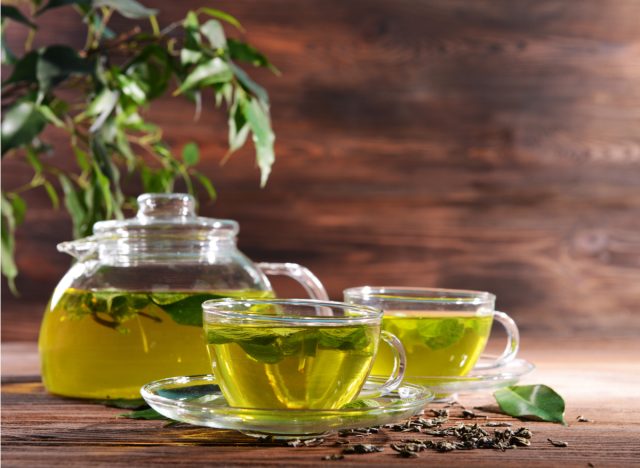
Green tea is one of the healthiest beverages you can drink.
“Green tea is packed with disease-fighting antioxidants, as well as the antioxidant EGCG, which research shows can enhance fat burning and increase metabolism,” say Eat This, Not That! Medical Expert Board members Tammy Lakatos Shames, RD, CDN, CFT and Lyssie Lakatos, RD, CDN, CFT, also known as the Nutrition Twins.
Among the best variations of green tea is matcha, which contains a higher concentration of epigallocatechin gallate (EGCG), which is also one of the most potent anti-inflammatory polyphenols. A number of studies have suggested that drinking matcha green tea may reduce symptoms of various inflammatory disorders. In one 2022 report in the journal Food Science and Human Wellness, researchers say green tea polyphenols strengthen the epithelial barrier in the gut and support the healthy composition of gut microbes, which improves outcomes for patients suffering from inflammatory bowel disease (IBD).
Ginger tea
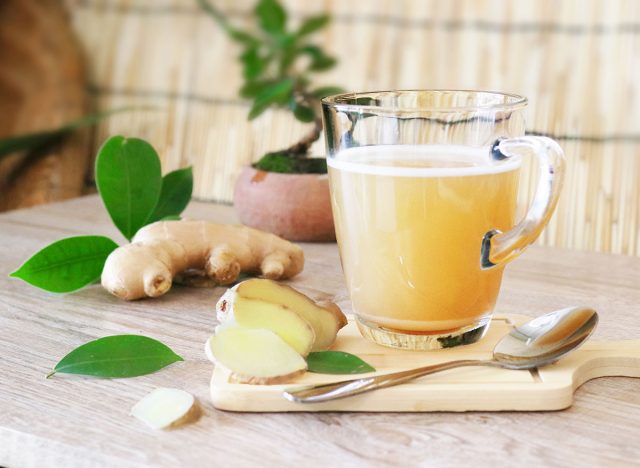
Whether it’s enjoyed hot or over ice, ginger tea is one of the best drinks for inflammation. The tasty spice has been used for thousands of years to soothe upset stomachs and nausea, as well as reduce pain. According to the Arthritis Foundation, it may also be a natural way to lessen soreness from inflamed joints. A University of Miami study compared the effects of ginger extract to a placebo in 247 patients suffering from osteoarthritis of the knee and found that the ginger reduced pain and stiffness by 40% more than the placebo. In addition to its anti-inflammatory properties, some researchers say it also works as an analgesic, which is a pain reliever.
Tart cherry juice
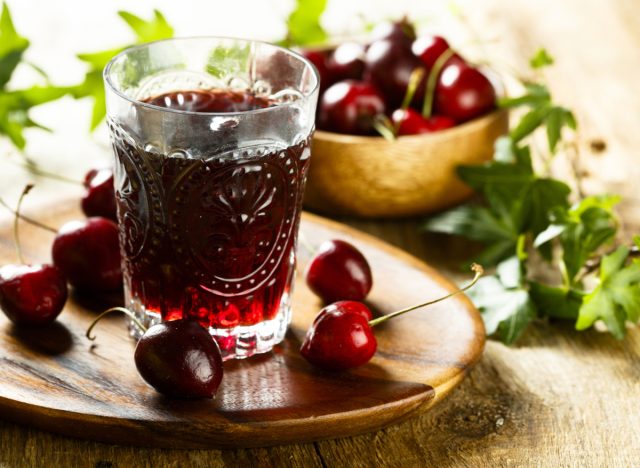
If you love the taste of cherry juice and want a sweet treat that also doubles as a health boost, try a glass of tart cherry juice. The juice of tart cherries has been shown to be beneficial for reducing the risk of cardiovascular disease because studies indicate it can lower blood pressure and LDL (bad) cholesterol.
A 2019 study in the journal Nutrients suggests that the heart-healthy effects on blood pressure and cholesterol may be attributed in part to the juice’s antioxidant and anti-inflammatory properties. In this small randomized controlled clinical trial, 37 men and women ages 65 to 80 were assigned to drink either 2 cups of tart cherry juice or a control drink every day for 12 weeks. At the end of the 12 weeks, blood samples were taken, and researchers found that only those subjects who drank the cherry juice lowered levels of inflammation markers, including c-reactive protein, compared to the control group.
Bone broth
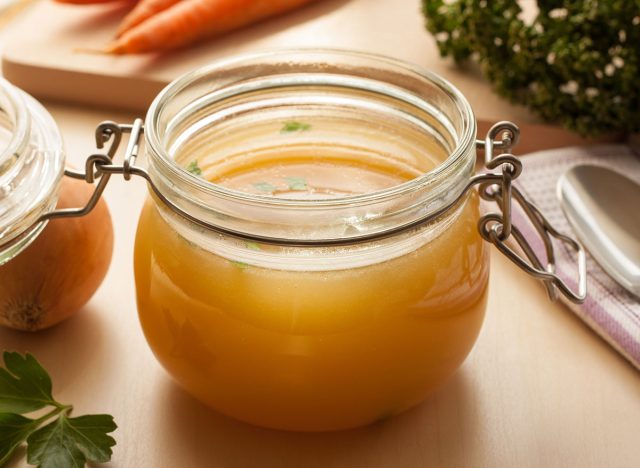
There’s no doubt you’ve used bone broth as stock for soups, or maybe you’ve sipped it in a steaming mug on a cold winter day. The broth made from simmering the bones and connective tissues of chickens, cattle, and other animals has become a health elixir due to its concentration of nutritious minerals, vitamins, and amino acids, which support a healthy gut microbiome.
“Our best line of defense against chronic inflammation is the health of our gut,” says Samantha Presicci, MSN, RD, LD, a registered dietitian at Fond Bone Broth. Poor gut health can lead to a condition known as “leaky gut,” which is characterized by a compromised lining of the gut that allows unhealthy substances to leak into your bloodstream, triggering inflammation, according to a review in the journal Gut. Bone broth is rich in collagen, gelatin, glycine, glutamine, and hydroxyproline, all of which have numerous clinical studies suggesting their ability to reduce inflammation.
“Collagen helps to nourish the intestinal lining, and gelatin is able to absorb water and help maintain the layer of mucus that keeps gut microbes away from the intestinal lining,” Presicci says. “Bone broth is easy for a damaged gut to digest and absorb, allowing you to reap the benefits of its amino acids and minerals for healing.”
A previous version of this story was published on June 12, 2022. It has been updated to include additional copy and proofreading revisions, additional research, and updated contextual links.

